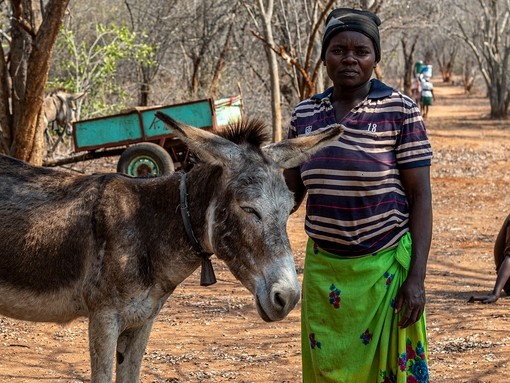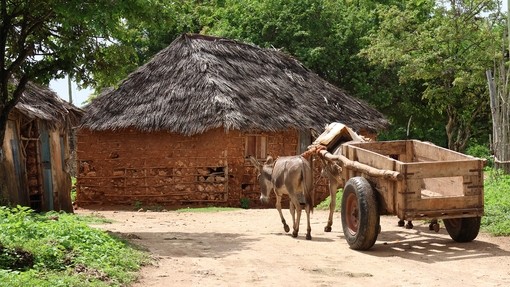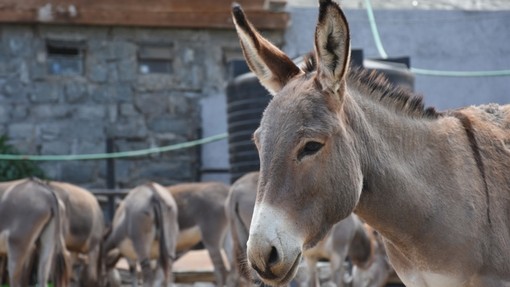
Working in partnership with Women and Land Zimbabwe
In the Mwenezi District of Masvingo Province, in the drought-stricken South of Zimbabwe, women are building resilience in their communities by looking after some of their most important allies in food cultivation, donkeys.
In April this year, 2024, the Zimbabwean president declared a nationwide state of disaster in response to the El Niño-induced drought, which has led to crop failures, water scarcity and skyrocketing food prices.
The southern provinces of Zimbabwe are among the areas most affected. Many women in the region are involved in agricultural production. They rely heavily on donkeys to transport water, till fields and carry goods to market, so they can feed their families and generate a modest income.
It is here, at a series of Rural Women’s Assemblies, that women have found a space to share knowledge and learn new skills through a programme coordinated by land rights organisation, Women and Land Zimbabwe, in partnership with The Donkey Sanctuary.
The aim of the project is to work with women to improve the welfare of their working donkeys, and in doing so, protect one of their most valuable assets.

Historically, donkeys have been regarded as a low status animal, their labour often undervalued, unseen and undocumented. Central to the project is recognition of donkeys’ inherent value, the vital role they play in food cultivation and distribution, and a greater understanding of the positive impact a higher standard of welfare will have on the contribution they make.
The assemblies create opportunities for women to share knowledge and access training to improve the welfare of their animals. Participants learn practical skills to share with others, such as making improved harnesses and using local resources to make lasting fodder for their donkeys. Importantly, they also learn how to carry out body condition scores so they can teach others to recognise if their donkeys need rest, nourishment or veterinary attention.
Thandiwe (pictured below) from Myamana village has become a proud donkey owner and a passionate advocate for their welfare. Through the project she has learned how to make her own harnesses using softer, cotton sacks instead of rubber which is more commonly used.
She describes the value her donkeys bring: “I have two donkeys, Sonic and Jericho. I’ve only been able to put food on the table because they take me to the mill when I need mealie meal for my family. I don’t have to carry buckets of water on my head as I now use the donkey cart. Before this, I was overwhelmed as the burden to fetch water and firewood was my own.”

The prevailing drought has forced women and their donkey co-workers to travel ever greater distances to fetch water, or queue for extended periods of time, without shelter, in the sweltering heat. One of the project’s successes has been working with community members to drill more boreholes, with separate donkey drinking troughs for donkeys, to avoid cross-contamination. As well as improving access to water that is safe to drink and can be used to irrigate crops and donkey fodder, donkeys now have points where they can stop and hydrate during their working day.
Dudzirai, a 51-year-old widow from Machokoto village relies on her small herd of donkeys to pull carts transporting water, firewood and produce for sale.
She said: “I use my donkeys to carry the manure they produce to my garden. I apply the manure to my vegetables, tomatoes and paprika and sell the harvest at the market. The donkey has become my ‘door key’ as it is opening doors where I earn an income and I am happy I can now pay my children’s school fees and buy their uniforms.”
Like anywhere, one of the most precious commodities is time. By increasing provision of local bore holes, the project has given women and their donkey co-workers back the hours they might have spent seeking that other precious commodity, water. For women this means more time to spend on cultivating food, generating income, and in the company of friends and family. For donkeys, this means more time to rest, graze and follow their natural behaviours, all essential to their good welfare.
So far, over 2400 donkey owners and users have taken part, representing 2,240 households and reaching 8,277 donkeys.
By recognising the value of donkeys and investing in their welfare, the women in this region are not only making a powerful difference to the lives of these animals, together they are also building the skills and infrastructure they need to continue feeding their communities in an ever harsher climate.
Find out more about Women and land Zimbabwe and their work
Learn moreShare this page
Tags
- News






